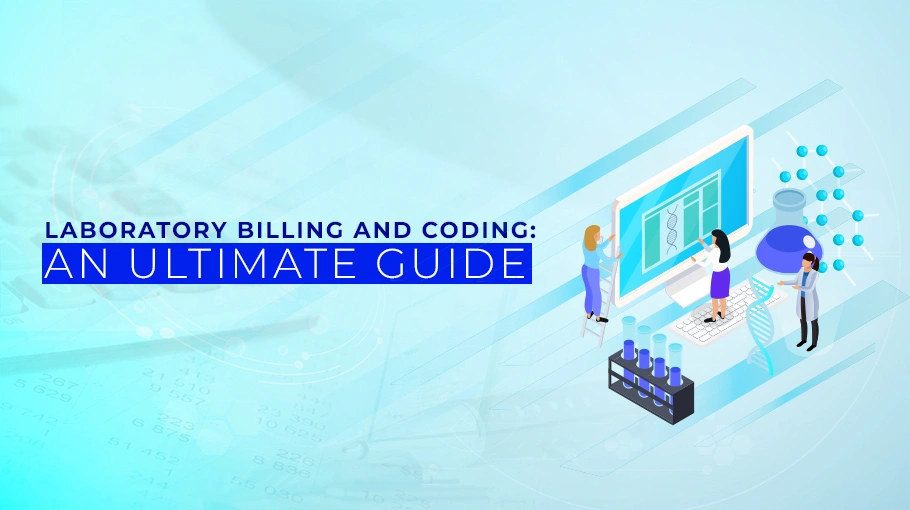Understanding the ins and outs of laboratory billing and coding is essential in the always-changing world of healthcare. This specialized area is vital to the financial stability of medical facilities, offices, and labs. The comprehensive guide offers insights, pertinent facts, and advice to help you navigate these dark waters to simplify the complex world of laboratory billing and coding.
Importance of Laboratory Billing and Coding
According to the Centers for Medicare and Medicaid Services, healthcare providers in the United States billed for more than $3.6 trillion in health expenditures in 2020. A substantial portion of this revenue is dependent on accurate billing and coding.
Laboratory billing and coding are critical components of revenue cycle management. They ensure accurate patient diagnoses and treatment documentation, facilitating appropriate reimbursement from insurance companies. Errors or inefficiencies in this process can lead to significant financial losses, making proficiency in billing and coding a cornerstone of successful healthcare management.
Understanding Laboratory Billing
Laboratory billing is a multifaceted process involving patient registration, confirmation of medical coverage, coding of services, claim submission, and follow-up.
Patient Registration
The billing process starts with capturing the patient’s demographic and insurance information.
Confirmation of Medical Coverage: The healthcare provider or lab confirms the patient’s insurance coverage and verifies the services covered under their policy.
Coding of Services
Based on the services rendered, appropriate medical codes are assigned. This is a critical step, as incorrect or incomplete coding can lead to claim denials.
Claim Submission
The coded claims are then submitted to the insurance company for reimbursement.
Follow-up
In case of claim denials or discrepancies, follow-ups are made to resolve the issue and ensure payment.
Decoding Medical Coding
Medical coding is converting patient diagnoses and procedures into universal medical alphanumeric codes. The two primary coding systems used in healthcare are the International Classification of Diseases, Tenth Revision, Clinical Modification (ICD-10-CM), and the Current Procedural Terminology (CPT).
ICD-10-CM
These codes identify diseases, signs, symptoms, abnormal findings, complaints, social circumstances, and external causes of injury or illness.
CPT
The American Medical Association developed these codes to report medical, surgical, and diagnostic procedures and services.
The precise application of these codes directly impacts revenue generation. Incorrect or outdated codes can lead to claim denials or reduced reimbursement. According to the American Health Information Management Association (AHIMA), incorrect coding leads to over $36 billion in annual healthcare waste.
Challenges in Laboratory Billing Processes
Effective revenue cycle management (RCM) is fundamental to the functioning of every healthcare provider, be it a hospital, clinic, or private practice. However, the balance between providing patient care and managing administrative aspects often shifts, leaving room for issues in the billing process. Here are some common challenges doctors and healthcare providers may encounter and how to overcome them:
Insurance Verification
Patients might not always remember to inform about changes in their insurance coverage. As a healthcare provider, it’s essential to have a robust system for insurance verification every time a patient visits for lab work.
Patient Communication
Once the insurance coverage is determined, it is vital to ensure that the patients understand their payment responsibilities. Clear, precise communication about potential charges from the beginning can prevent billing disputes later.
Keeping Up with Information
Billing codes and insurance rules undergo regular changes. Using outdated codes can result in claim rejections. Healthcare providers must stay updated with the latest information to ensure smooth billing operations.
Automated Data Entry and Research
Relying on manual, paper-based claim filling can lead to inefficiencies and errors. Leveraging up-to-date software for data entry and code lookup can significantly save time and reduce errors, making the billing process more efficient.
Implementing a Review Process
In-house lab billing services often lack a rigorous review process to assess the amount of paid and unpaid claims and to identify recurring issues causing revenue loss. Establishing such a process and promptly communicating this information to the team can prevent revenue leakage.
Best Practices for Efficient Laboratory Billing and Coding
Continuing Education: Regular training and updates on the latest coding guidelines and changes are crucial.
Regular Auditing
Frequent internal and external audits can help identify and rectify coding errors and compliance issues.
Investing in Technology
Automated billing software can significantly reduce human error, increase efficiency, and streamline billing.
Fostering Clear Communication
Clear communication channels between clinicians, coders, and billing staff can help clarify medical documentation, leading to more accurate coding.
Outsourcing
Many healthcare providers and laboratories outsource their billing and coding to professional companies. This can offer cost benefits and improve billing efficiency but requires careful vetting to ensure quality control.
Future Trends in Laboratory Billing and Coding
With the evolution of healthcare regulations and technologies, staying ahead of the curve is essential for maintaining efficient and profitable laboratory billing and coding processes. Here are a few trends to watch:
Artificial Intelligence and Machine Learning
These technologies are increasingly being utilized to improve coding accuracy, reduce billing errors, and streamline the revenue cycle management process.
Telemedicine
The rapid growth of telemedicine, particularly during the COVID-19 pandemic, is changing the landscape of medical coding. New codes and billing practices are continually emerging to adapt to this burgeoning field.
Value-Based Care
The shift from fee-for-service to value-based care models is transforming the healthcare industry and, by extension, the billing and coding world. Under value-based care models, healthcare providers are paid based on patient health outcomes, requiring more detailed and accurate coding to reflect the quality of care.
3 Key Tools to Enhance Your Laboratory Billing Practices
Whether managing billing in-house or outsourcing, having the right tools can significantly improve your billing practices. The primary goal is to control costs, secure higher reimbursement rates, and maintain high-quality care. Here are three tools that can substantially elevate your laboratory billing:
1. Laboratory Information System (LIS)
An effective Laboratory Information System (LIS) allows lab techs and medical professionals to pinpoint revenue cycle issues contributing to financial burdens. It analyzes past data to forecast future performance. With a robust LIS, you can implement policies and procedures to avoid claim denials and boost profit potential.
2. Instant Adjudication
Your laboratory’s success hinges on the flow of clean, paid claims. With automated eligibility tools, you can verify a patient’s coverage, file a claim, and receive a response before the patient leaves the office. This expedited process can be a game-changer in improving your billing practices.
3. ICD-10 Converter Software
While larger practices may not view this as urgent, smaller labs requiring assistance with code conversion might find this software invaluable. The ICD-10 charts can convert up to 10,000 codes, significantly enhancing your chances of accurately coding your claims and minimizing denials.
These three tools could potentially revolutionize your laboratory billing practices and boost profitability. However, many labs find outsourcing all or part of their billing needs more efficient and cost-effective. Bellmedex provides customized lab billing solutions & systems tailored to your lab’s unique needs. From standalone services like AR Recovery and Census Entry to comprehensive billing services, we offer precisely what you need when you need it.
Bellmedex: Simplifying Laboratory Billing and Coding
In the complex healthcare landscape, laboratory billing and coding are integral components. Bellmedex provides reliable solutions to these challenges, streamlining complex processes and ensuring seamless revenue cycle management.
Accurate Medical Coding with Bellmedex
Accurate medical coding is pivotal to securing appropriate reimbursement from insurance companies. Bellmedex offers up-to-date and precise medical coding, mitigating the risk of incorrect or outdated codes leading to claim denials or reduced reimbursements.
Overcoming Common Billing Challenges
Bellmedex’s innovative solutions tackle common hurdles in lab billing processes effectively. Their services include insurance verification, improved patient communication, and automated data entry and research. Additionally, they ensure access to the latest billing codes and insurance rules, protecting healthcare providers from potential financial pitfalls.
Streamlining Operations with Robust Review Processes
Equipped with a robust review process, Bellmedex assesses paid and unpaid claims efficiently, identifies recurring issues causing revenue loss, and rectifies errors swiftly. This results in fortified billing systems and improved financial health for healthcare facilities.
Staying Ahead with Future Trends
Bellmedex stays attuned to future trends in laboratory billing and coding. Their innovative approach incorporates artificial intelligence, machine learning, and adaptations to the rapid growth of telemedicine and value-based care models, maintaining efficient and profitable processes.
Conclusion
Laboratory billing and coding play a vital role in healthcare revenue management. As healthcare regulations continually evolve, staying updated with these changes is crucial. This guide emphasizes the need to understand billing and coding processes, overcome common challenges, implement best practices, and keep up-to-date with future trends. Leveraging technology and tools can significantly enhance efficiency and profitability. Outsourcing to professional companies like Bellmedex can provide tailored solutions, ensuring quality control and efficient revenue cycle management. Bellmedex’s innovative approach and robust review processes are a reliable choice for simplifying the complex world of laboratory billing and coding.





